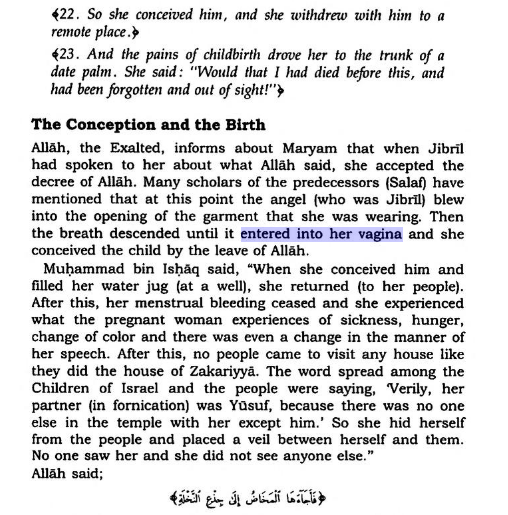Here's the actual wording of ibn Kathir (Source) - note that the paragraph with the statement of Muhammad ibn Ishaaq only appears a few paragraphs later-:
يقول تعالى مخبرا عن مريم أنها لما قال لها جبريل عن الله تعالى ما قال : إنها استسلمت لقضاء الله تعالى فذكر غير واحد من علماء السلف أن الملك - وهو جبريل عليه السلام - عند ذلك نفخ في جيب درعها ، فنزلت النفخة حتى ولجت في الفرج ، فحملت بالولد بإذن الله تعالى .
The Arabic word which was translated as vagina is الفرج however this generally means a gap or cleave and may refer to the private parts of both men and women and some animals too. Note that the wording as is written in Arabic doesn't sound obscene it is rather neutral.
It could sound obscene depending the context and cultural circumstances. For example the understanding and variety in Arabic vocabulary has changed in the last 14 centuries and will still do, this is why many words which originally had different meanings are now understood in only one of them.
Further there's a statement often repeated by scholars:
لا حياء في الدين
There is no shyness in religion
Which is based on this sahih hadith.
As for the narration it was for example mentioned in imam at-Tabari's tafsir -see for example here- where different reports are displayed here I'll only share the first as an example:
حدثني محمد بن سهل ، قال : ثنا إسماعيل بن عبد الكريم ، قال : ثني عبد الصمد بن معقل ابن أخي وهب بن منبه ، قال : سمعت وهبا قال : لما أرسل الله جبريل إلى مريم تمثل لها بشرا سويا فقالت له : ( إني أعوذ بالرحمن منك إن كنت تقيا ) ثم نفخ في جيب درعها حتى وصلت النفخة إلى الرحم فاشتملت .
I was informed by Muhammad ibn Sahl: Who said, we were informed by Isma'ail ibn 'Abdualkabir, who said, I was informed by 'Abdussamad ibn Mi'aqal the son of the brother of Wahb ibn Munabbih who said: I've heard Wahb saying: When Allah sent Jibreel to Maryam, he came in a human shape, and she said to him: She said, "Indeed, I seek refuge in the Most Merciful from you, [so leave me], if you should be fearing of Allah .". Then he blew into her shield pocket (opening of her garment) until the blow reached the womb and it was complete.
This was reported by Wahb ibn Munabbih وَهْبِ بْنِ مُنَبِّهٍ, as-Suddy السُّدِّيِّ and ibn Jurayj ابْنُ جُرَيْجٍ.
Honestly I don't know what you want to say with:
The word "Fihi" is masculine in the verses that talks about Mary's chastity and it may refer to the garment of Mary (Alahisalam). The word "Fiha" is the feminine one and it may refer to Marry herself.
because there's nowhere in the context of the relevant verse -in this surah- a mentioning of "fihi".

